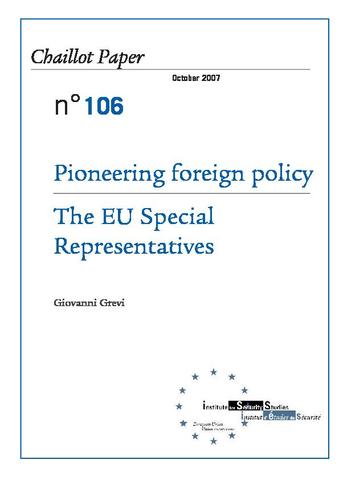You are here
Pioneering foreign policy: the EU Special Representatives

There can be no common European foreign policy without adequate instruments to collect information on the ground, represent the Union at the political level, and coordinate all the tools of EU foreign policy to achieve maximum influence out of joint action. The EU Special Representatives (EUSRs) play an important role in providing information, representation and coordination, thereby enhancing the profile of the Union in countries and regions of critical concern.
The EUSRs stand at the crossroads between the institutional dynamics of the Brussels headquarters, the often heterogeneous priorities of EU Member States, and the requirements for action in the field. This is not always a comfortable position, but it is a pivotal one if EU foreign policy is to develop in a coherent and effective manner.
As is the case with other structures in the CFSP framework, the EUSRs have been largely developing out of practice, in a creative but also quite chaotic manner. That has allowed for much-needed flexibility, but has somewhat compromised unity of purpose across EU institutions and Member States. However, a clear trend can be detected towards the Special Representatives becoming more firmly anchored in the proceedings of the Council Secretariat, and enhancing their exchanges with national representatives in Brussels-based committees, notably the Political and Security Committee.
In practice, EUSRs have been tasked with crisis prevention, crisis management at the political level and conflict resolution, as well as with supporting peace building and political transition, and helping shape the EU approach to regions at risk. Together with their knowledge of the field, the biggest asset of the EUSRs is the political mandate given to them by the Member States, which they can ‘spend’ abroad to gain influence. However, their action has not always been connected with a broader EU foreign policy strategy, which has affected their performance in the field. Likewise, divergence between Member States at times makes it very hard for EUSRs to fulfil their mission, which reflects negatively on EU foreign policy at large.
The first EU Special Representatives were appointed in 1996 (Special Envoy to the African Great Lakes and Special Envoy to the Middle East peace process). Since then, their number has grown to ten and their policy remit has steadily expanded. This demonstrates the urgent need for the Union to acquire diplomatic capabilities to deploy on the ground, often in parallel to crisis management operations under ESDP. Since the launch of ESDP, only the EUSR for Central Asia has been operating in the absence of the parallel deployment of ESDP operations, while only two ESDP operations – the Aceh Monitoring Mission and the rule-of-law mission for Iraq EUJUST LEX – have been conducted in the absence of Special Representatives. The two sets of instruments are clearly linked and mutually supporting, with the EUSR providing political guidance to the Head of Missions or the Force Commanders.
The EUSRs have been playing an important role of coordination of EU instruments in the field, notably when more than one ESDP operation is deployed. Some EUSRs, however, have been mandated with maintaining an overview and promoting the overall coherence of EU action across the Community and the inter-governmental pillars of policy making. That has not entailed a breach of respective competences, but has opened the way to closer cooperation among EU actors, towards a more integrated foreign policy. In the field, coordination by objective has been making strides, although often with considerable delay, and original solutions have been devised to enhance the coherence of EU action, such as for example in Moldova and in South Caucasus. New policy packages such as the European Neighbourhood Policy and new financial instruments such as the Stability Instrument provide more opportunities for synergy between EU foreign policy actors.
In this perspective, an important innovation has been introduced in FYROM, with the ‘double-hatting’ of the same person as EUSR and the Head of the Commission Delegation in Skopje. While this is a ‘personal union’ of two functions that remain distinct, it has provided considerable added value in terms of visibility, coherence and political clout. The advantages of double-hatting are self-evident: financial leverage and political authority are invested in the same person. That said, with a view to applying this model elsewhere, it is understood that the precise features of double-hatting will depend on the political and security conditions on the ground. The establishment of an integrated position of EU representative to the African Union (AU) in Addis Abeba, holding the functions of EUSR and of Head of the Commission Delegation to the AU, marks yet another step to enhance the coherence and effectiveness of EU foreign policy. As stated in a joint note by SG/HR Solana and Commissioner Michel, this appointment shows a common will ‘to combine all the instruments of the European Union and thereby ensure a coherent approach towards Africa at all levels.’ This evolution is a notable by-product of the rich and diverse experience accumulated by the EUSRs over the last ten years.
The achievements and the shortcomings of EUSRs are an important indicator, among others, of the successes and failures of CFSP. As such, their experience is worth reviewing since it provides relevant insights into the whole process of setting up the European External Action Service, as envisaged under the new Lisbon Treaty.